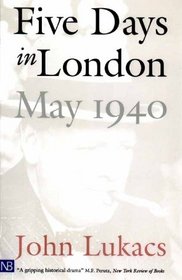Way too many footnotes, very irritating. Author was 75 years old when he wrote this book, and it shows. He meanders a lot. His main premise is that the crucial point in WW2 was these 5 days, when the UK supposedly considered entering into talks with Hitler. Even his writing doesn't convince me that it was a crucial decision.
Excellent, well-researched perspective drawing on multiple sources, including contemporary writers' personal experiences and the Mass Observation project data (a kind of opinion survey of the time in England).
I found Lukacs stuck well to the scope of his project and I appreciated his breadth and depth of knowledge of his subject. Far from his age at writing being a "negative", for me it added to the book's value.
I am now interested in reading a later book Lukacs wrote called Democracy and Populism, since we live in a time rife with demagoguery.
I found Lukacs stuck well to the scope of his project and I appreciated his breadth and depth of knowledge of his subject. Far from his age at writing being a "negative", for me it added to the book's value.
I am now interested in reading a later book Lukacs wrote called Democracy and Populism, since we live in a time rife with demagoguery.
This short but deep dive into diplomatic history tells the story of the first five days of Winston Churchill's Prime Ministership. Lukacs' thesis is that this five-day period was crucial because during it WWII was not won but it was not lost to Hitler either. Lukacs concentrates on the struggle between Churchill who wanted to put a thumb in Hitler's eye at every chance and Chamberlain and Halifax who were for appeasing Hitler. Lukacs examines the conflict one day at a time, describing meetings of heavy discussions and fascinating survey results reporting on the mood of the country. With the Dunkirk evacuation and Hitler taking over Norway too, the backdrop could not be more dramatic. Worth reading for WWII buffs who like getting into the weeds.
I was looking at the recent trailers added to the Internet movie Database, and one of them is on Winston Churchill during the period covered by this book. I can't wait to see if, but I don't think it is suppose to be out until December 2018. I hope I got that wrong.
The author's premise is that during these five days, the British cabinet came close to agreeing to discuss with Hitler his terms for ending the war. Churchill opposed this, and finally won over most of the cabinet. If he had agreed, Hitler would have won "his war," as the author termed it. Afterwards, Hitler never had a chance to win "his war," only to end a war and establish a status quo. Fortunately, things went slowly downhill for the Nazis and the world is a better place, even with all the problems we have now.
Still, readers should be aware the author isn't always clear in his arguments and rambles somewhat, making it difficult to follow his premise at time, which is why I give it three stars.
The author's premise is that during these five days, the British cabinet came close to agreeing to discuss with Hitler his terms for ending the war. Churchill opposed this, and finally won over most of the cabinet. If he had agreed, Hitler would have won "his war," as the author termed it. Afterwards, Hitler never had a chance to win "his war," only to end a war and establish a status quo. Fortunately, things went slowly downhill for the Nazis and the world is a better place, even with all the problems we have now.
Still, readers should be aware the author isn't always clear in his arguments and rambles somewhat, making it difficult to follow his premise at time, which is why I give it three stars.




